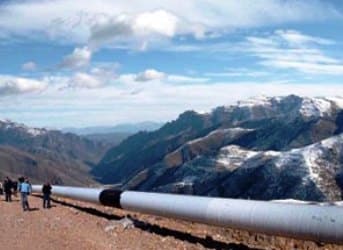Secretary of State Hillary Clinton said U.S. energy policies extend beyond high-profile issues like the Keystone XL pipeline and retail gasoline prices. The State Department, she said, conducts a "great deal" of energy-related diplomacy when specific needs arise. In states like Iran, statecraft is needed to prevent the country from using oil and gas revenue to fund a controversial nuclear program. In Libya, diplomacy was needed to ensure oil market stability during last year's civil war. For countries in the European Union, meanwhile, ensuring energy security is a matter of international and U.S. national concern.
Clinton told students at Georgetown University in Washington D.C. that energy issues cut across the entire spectrum of U.S. foreign policy.
"It’s a matter of national security and global stability. It’s at the heart of the global economy," she said. "It’s also an issue of democracy and human rights."
Energy policy, she said, is at the "core" of geopolitical manoeuvring. Nation's rich in oil and natural gas reserves may be more powerful than others, meaning energy is also a source of conflict and cooperation.
Russian President Vladimir Putin, staving off criticism of monopolizing power in the Kremlin, met recently with BP's Chief Executive Officer Bob Dudley to review the status of joint venture TNK-BP. Dudley was run out of his Moscow offices in 2008 when, as chief of TNK-BP, he was accused of favoring British interests. If BP shareholders approve of a sale of its half of the troubled venture to Rosneft, the Russian oil company may become one of the biggest in the world.
Related Article: Baghdad is Losing Iraqi Kurdistan - Empowered by Oil and Gas
Europe, meanwhile, is eager to break the Russian grip on the regional energy sector. Most of the Russian natural gas bound for European markets runs through Soviet-era pipelines in Ukraine. A troubled relationship between Kiev and the Kremlin has left downstream consumers in the Eurozone in the cold on more than one occasion.
Clinton said her focus on energy diplomacy was aimed at promoting competition and preventing monopolies in Europe. For many decades, the secretary said, the European community got most of its gas from Russian energy company Gazprom. With more gas reserves on hand in the United States, however, there are more alternatives on the global market, namely from Azerbiajan.
"They’d like to sell it, and Europe would like to buy it," she said. "But first, they need to build pipelines."
European leaders are pushing for a network of projects dubbed the Southern Corridor, a series of pipelines that includes the much-debated Nabucco pipeline. By tapping into Azeri reserves in the Caspian Sea, troubled economies in the European Union would no longer be vulnerable to the risky take-or-pay pricing schemes of Gazprom.
Clinton said that breaking up energy monopolies leads to stronger economies. When one nation relies too much on another for energy, it's at risk of being controlled by that nation. That, in turn, leads to national security threats, something NATO recognized when it placed a priority on energy security. With issues like energy, the secretary said, everything's on the table.
ADVERTISEMENT
"It’s not just a matter of economic competition, as important as that is," she said. "It’s also a matter of national and international security."
By. Daniel J. Graeber of Oilprice.com



















Thank you.
Indications are that if the US and/or Israel attacks Iran, this will probably affect power supplies to Armenia. If Armenia is left without power, then Russia may well intervene by driving straight through Georgia to come to Armenias aid. If this happens she will take control of Georgia and of the gas and oil flowing from Azerbaijan through Georgia.
Interesting scenario...?